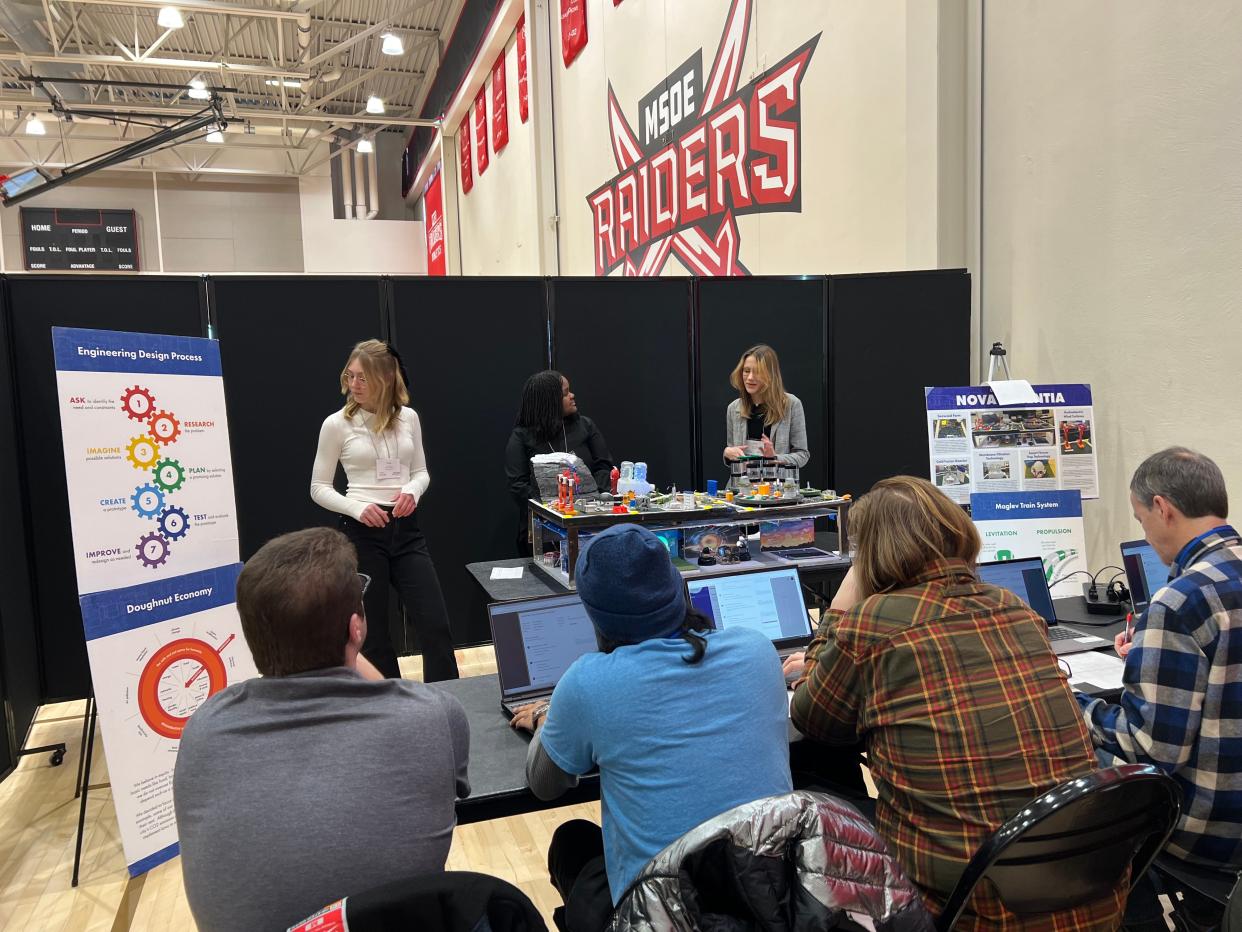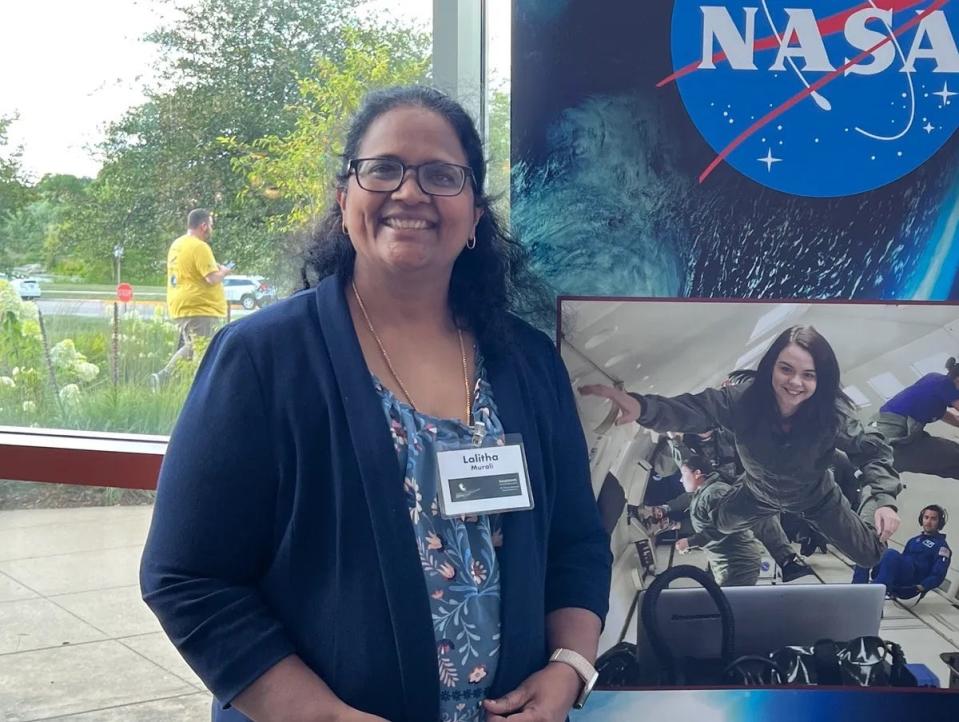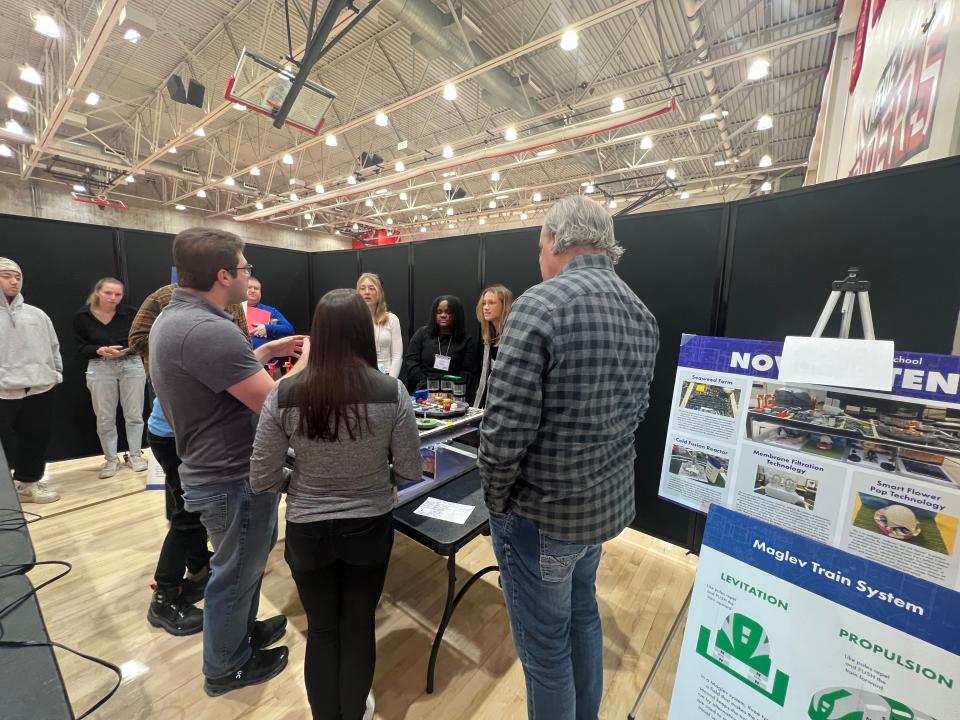From classroom to cosmos: Glen Hills teacher pioneers student-led NASA projects

In a few weeks, a Glen Hills Middle School teacher will spend 11 minutes in zero gravity with NASA to conduct an experiment she and her students designed.
Lalitha Murali, teacher and gifted program coordinator at Glen Hills, will test carbon dioxide leakage patterns while experiencing the weightless environment on the Zero-G G-Force One aircraft, a specially modified Boeing 727 where one "can float, flip and soar as if in space," according to the Zero-G website.
Murali and 10 other teachers who submitted winning proposals for zero gravity experiments that aligned with their classwork will fly 32,000 feet above the Kennedy Space Center in Florida between March 5 and 8.
It is not yet known which date in early March Murali will fly. The flight has already been postponed four times due to weather issues, aircraft maintenance and a pilot shortage.
Carbon dioxide and zero gravity are topics Murali and her students have been studying for the last two years in class and while preparing for the Future City Competition, where students design and present models of sustainable cities. On Jan. 20, her students were named state champions of the regional competition for the fifth year in a row.
As these students prepare to compete in Washington D.C. in February, they are also preparing to watch Murali's flight from their classroom in Glendale ― and for all of it to be featured in a documentary called "My Teacher in Space" produced by Lorinsuz Films.
The documentary will feature a handful of Murali's innovative classroom lessons, highlight the supportive network of space and research professionals and showcase Murali's work in cultivating STEM opportunities for her students.
"With Lalitha, every child is gifted and talented if given the opportunity," Suzanne Jurva, producer of the documentary, said.
Devising a winning experiment
It all started when Murali, an empty nester after her two daughters left for college, started searching for professional development opportunities during the summer of 2022.
She was accepted into a paid, seven-week research program at the University of Wisconsin-Madison where she worked with Jason Kawasaki, an associate professor in the Materials Science & Engineering Department, studying the piezoelectric capacities of crystals.
Through the program, she developed a modified lesson plan for their middle school students on the subject, and the university provided materials for Murali to teach it to all 120 seventh graders at Glen Hills.
The experiment was the first of many unique learning opportunities Murali would bring ― and is still bringing, she said ― to her students.
Later that year, Murali was accepted into a three-day workshop on microgravity lead by Kevin Crosby, director of the Wisconsin Space Grant Consortium based at Carthage College.
Crosby invited Murali to apply for the Space for Teachers initiative: if she could pitch a lesson plan for their students that aligned with the college's research, she could be selected to conduct experiments in zero gravity.
At the time, Murali's students were working on their 2023 Future City Project, which involved building carbon dioxide sensors using Arduino kits, which allow students to build interactive, internet-connected devices.
To broaden the lesson, Murali invited presenters from the aerospace and defense electronics company Teledyne who showed her students how to use a FLIR, or Forward Looking Infrared camera, which shows carbon dioxide.
Murali's students Philippe-Christophe Geli and Nola Quinn said the lesson where they were able to see carbon dioxide exit a flute while playing was one of their favorites.
“It was exciting to see everybody’s face light up when they got to see it,” Nola said. “It was cool to see everybody so engaged.”
The experiment Murali and her students designed based on the FLIR camera lesson would be one of 10 selected for the Space for Teachers Initiative.
In zero gravity, Murali will test carbon dioxide leakage patterns in using their Arduino kit sensors and the FLIR camera. Through the experiment, her students are evaluating the effect of gravity on gases, which might someday come in handy for astronauts experiencing leakages in space, she said.

Experiences stem from Murali's ambition and network of free programs
Murali seeks to cultivate in her students an intrinsically driven curiosity and deep understandings of the subjects they have interest in, she said.
Murali has brought dozens of space professionals and researchers from around the country to lead lessons, presentations and experiments in her classroom, including Milwaukee native Darian Dixon who worked on Mars rovers for NASA, and leader of the Milwaukee School of Engineering's lunar robotics team Amber Rothe.
By the end of Rothe's lesson on microgravity, Murali's students were able to easily answer questions the MSOE student's fellow undergrads struggled with, Murali said.
After his presentation, Dixon was inspired to create an internship program for a few of Murali's students who are working with UW-Milwaukee's Geosciences department.
In order to accommodate her school's growing interest in space and STEM, Murali started an after-school STEM club this school year where around 60 students in fourth through eighth grade are currently working on NASA-designed projects, including designing bottle rockets.
These opportunities have brought Murali's students invaluable information for their education but also career and personal growth opportunities. A handful of her students have been offered internships with NASA and others are in the midst of a mentorship programs with Kawasaki at UW-Madison and Dixon at University of Wisconsin-Milwaukee.
Last summer, Murali traveled to four different space and STEM educator programs across the country to bring information back to her students and create networking opportunities for them.
She said the opportunities, which cost the district zero dollars, wouldn't have been possible without NASA sponsorships and the supportive networks of educators, space professionals and patrons of STEM education.
"There are thousands of free professional development opportunities out there for educators," she said, encouraging other educators wondering how to spend their summers to explore their options.
Redefining 'gifted and talented'
Murali said she wants her students and her school district to feel proud of the curiosity and ambition they've embraced through these endeavors.
"I am only a facilitator," she said. "I just brought in all the opportunities for them. They are the ones soaking it in and taking advantage of the learning opportunities. That's the beauty of exposure."
From Future City medals to documentary features, the accomplishments would be remarkable for any school, let alone a public school with a majority of the student body from historically disadvantaged groups, Murali said.
For the 2022-23 school year, the school reported that almost 60% of its students were non-white, according to the Wisconsin Department of Public Instruction's report card on Glen Hills.
Murali said part of the school's successes are a result of administrators embracing Murali's desire to open the school's gifted and talented program to more children, making personalized, hands-on instruction more accessible.
That desire was borne out of past experience.
Murali started her teaching career 16 years ago at Glen Hills Middle School as a part-time English as a Second Language teacher but was soon asked to also work with a small group of students deemed "gifted and talented."
But something about the school's gifted system felt wrong to Murali. "How could a school with over 1,000 students have only three or four students identified as gifted?" she asked the superintendent in a meeting years ago.
"I wanted to service kids who were proficient and above to help more children grow their interests and strengths. But even if a child doesn't test in the 98th percentile, if they feel supported and motivated working with a gifted and talented teacher, I want to work with them," she said.
There might be a few kids she teaches who have been officially tested for "giftedness," but you wouldn't know it if you were to step into her classroom, she said.
"It doesn't matter whether they have the score, if the child really wants to do Future City, that child is welcome to come to me."
Now, Murali works with around 30 kids from each grade on subjects ranging from STEM to language arts to geography.
Murali isn't just an advocate for Glenn Hills students. As president for the Wisconsin Science Education Foundation, she's encouraged Milwaukee Public School students to participate in the foundation's Badger State Science and Engineering Fair.
Murali said the fair used to be mostly populated by suburban and parish schools, but after presenting before MPS teachers and administrators, last year's fair saw 60 MPS students participate. It was the first time Milwaukee Public Schools participated in the fair, she said.
"A program like this and a teacher like this in a school like this, is creating access and creating opportunities," Jurva said. "That's what we wanted to show."
Contact Claudia Levens at clevens@gannett.com. Follow her on X at @levensc13.

This article originally appeared on Milwaukee Journal Sentinel: A Glen Hills teacher will fly with NASA to conduct her student's experiments in zero gravity

